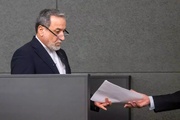No exact date has been set for resuming the Vienna talks that ended on Friday. Enrique Mora, the EU Deputy Director-General for External Action Service, only said that the talks would be resumed next week. Over the last few days, there have been unofficial reports that they will resume on Thursday.
The current uncertainty over the resumption date is per se seen as part of the West’s response to what Iran presented during the much-awaited talks that took place last week after a five-month hiatus. Western diplomats were quick to announce the failure of the talks even before their end.
French President Emmanuel Macron announced the failure of the talks during his visit to Dubai the same day the negotiators in Vienna held a plenary session to review the progress made in the meetings of the experts. Speaking to reporters in Dubai, Macron claimed Friday that the current round of talks had not been successful, and hinted that there would be a delay before the next round takes place.
“I think it's probable that this round of negotiations, given the positions, does not succeed,” he said according to Reuters. “It is most likely that these negotiations do not continue in the short term.”
Since then, the Europeans, together with their American allies, refused to announce a date for their return to Vienna. But Iran’s chief negotiator, Ali Bagheri Kani, put an end to speculations over when the talks would resume. Speaking to reporters in Moscow on Tuesday, Bagheri Kani said the talks would resume on Thursday.
Aside from the date, the Vienna talks are expected to face a bumpy road in terms of how to revive the 2015 nuclear deal, officially known as the Joint Comprehensive Plan of Action (JCPOA). On the one hand, the Europeans have inveighed against Iran, accusing it of pursuing maximalist demands.
“Iran's proposals regarding its nuclear file do not constitute a reasonable basis for any agreement,” the French foreign ministry said on Tuesday.
Earlier, the German Foreign Office echoed a similar position. It said Iran’s proposals are “not a basis for a successful end to talks.”
“We reviewed the proposals ... carefully and thoroughly and concluded that Iran violated almost all compromises found previously in months of hard negotiations,” a German Foreign Office spokeswoman said on Monday.
On the other hand, Iran keeps insisting that it has entered the talks with a realistic and pragmatic view and is ready to reach a good agreement but not at any cost.
In an interview with Iran’s state TV from Moscow, Bagheri Kani described Tehran’s proposals as “useful and constructive that can seriously push the process of talks forward.”
During the current round of talks, the Iranian negotiators presented two draft proposals regarding sanctions and nuclear-related steps if talks were to lead to an agreement.
The Europeans and Americans dismissed the proposals as containing maximalist demands and therefore unrealistic. The Europeans’ response created an atmosphere in which Iran was seen as the culprit for the alleged failure of the talks. But this is simply not true.
It soon came to light that it was Iran that made everything in its power to push the talks forward at a time when Europe and the US were pushing for maximalist demands that go beyond the terms of the JCPOA.
After the recent round of talks, Western diplomats accused Iran of backtracking on the previous hard-won compromises reached during the past six rounds. Again, this is not true because Iran made it clear that Vienna talks should only lead to the mere revival of the JCPOA without adding or deducting anything from it. In fact, Iran’s proposals are based on the terms of the nuclear deal and only seek to revive it. The Iranian proposals made it crystal clear that the JCPOA is not re-negotiable. This is while the West seems to want to revive a renegotiated JCPOA that would give Iran less and extract more concessions from it. In other words, the West wants the JCPOA of 2021 not that of 2015. On the contrary, Iran does want the 2015 deal to be the basis for the US to begin implementing its obligations.
Another point is the Western claim that Iran backed down on what has been achieved during the past six rounds. Iran’s proposals have been drafted in strict conformity with the provisions of the JCPOA and have drawn on the past rounds to great extent. Obviously, the past rounds are mere drafts and should by no means be deemed a binding agreement.
As things stand, Western countries want the JCPOA to be adjusted to their behavior. This is just unfair and that Western behavior should be adjusted to the JCPOA.
First published in Tehran Times


























Your Comment